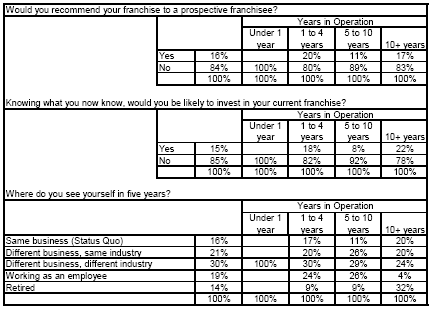
If franchisee satisfaction is, as we believe, an important indicator of future actions, the next few years could be challenging for the franchise industry.
Future success for most franchisors is dependent on the renewal of existing franchises and the sale of new franchises. Current franchisees play an important role in this process. In addition to royalties and other payments to the franchisor, franchisees also serve as referral agents that impact on new sales. The thoughts and intentions of current franchisees is crucial intelligence for a franchisor that can aid in building their franchise network. Franchisors can improve their operations and growth by understanding current levels of franchisee satisfaction and its impact.
Franchisees have had an exceptionally difficult year - possibly the worst of their working lives. National Franchisee Survey respondents report that few are meeting their financial goals, seeing increased revenues/profits or would consider recommending their current franchise to a prospective franchisee. The vast majority do not expect to be with their current franchise in five years time. Yet a majority consider their operation to be superior to that of the competition.
The following table shows three leading indicators that are incorporated into our National Franchisee Survey, from 2010:
What we see is troubling. By a wide margin, surveyed franchisees report that they would not provide a positive referral to a prospective franchisee. They also report that they would not have invested in their current franchise had they known what they now know. Since overall numbers can hide crucial differences such as those between newer and older franchisees, we also look at these indicators based on years in operation. We find similar results regardless of how long a franchisee has owned the business. This suggests that current concerns have existed for an extended period of time.
When asked about future plans, only 16% of respondents anticipate doing the same thing in five years. While only 14% anticipate retirement, 70% anticipate either owning a different business or being an employee for another business.
Should these patterns persist, many franchises will encounter significant challenges in the coming years. At the very least, a very large number of new franchisees will be needed to maintain the current infrastructure and revenues of the existing franchise networks. These new franchisees will be harder to find if current franchisees are not prepared to provide positive referrals. Some franchisors may choose to ignore these trends and could very well see a decline in their franchise network.
More enlightened franchisors will look inward to determine if the patterns we have identified are reflected within their network. Should these patterns be confirmed and reversed, short term benefits would likely include a reduction in costly internal litigation. Longer term trends would include a larger and growing franchise network plus a growing dominance within their respective industries.



Leave a comment